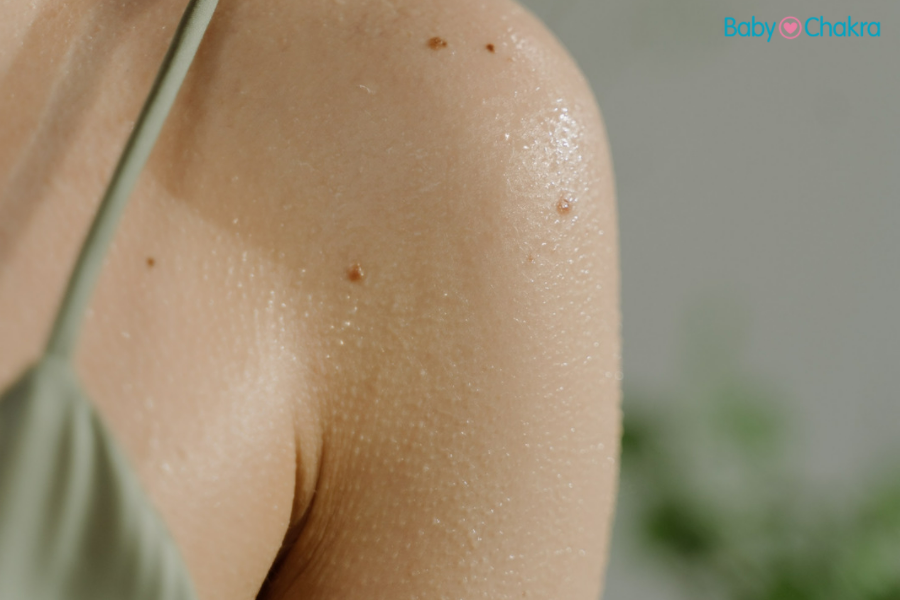
Postpartum Night Sweats: Causes, Signs, And Treatment
26 May 2022 | 4 min Read
Sayani Basu
Author | 607 Articles
There’s a plethora of physical changes you may experience during pregnancy. After delivery, you’ll notice that these changes—owing to hormonal fluctuations—may not necessarily recede, but lead to newer ones including the arrival of postpartum night sweats.
This hormonal issue can make it difficult to have a restful night’s sleep, with hot flashes being the common symptom. In fact, a 2013 study noted that night sweats are common and affect 29% of women after their delivery.
Although night sweats can make it difficult to fall asleep, your body is doing exactly what it needs to do to keep you healthy after childbirth. Your body takes 50% more blood and body fluids during pregnancy to support your baby’s growth. This fluid is no longer needed after your baby is born. Postpartum sweating is your body’s way of flushing out the excess fluid that helped keep you and your baby healthy during your pregnancy.
Here’s everything you need to know about postpartum night sweats.
Causes Of Postpartum Night Sweats
While postpartum night sweats are primarily attributed to disrupted hormone levels in the body and the fact that the body produces both progesterone and oestrogen in large amounts to support the growing baby, there are also some other reasons:
- After childbirth, these hormone levels are reduced considerably. This disruption in hormonal levels can prompt changes in body temperatures, leading to night sweats.
- Night sweats might also occur as a side-effect of taking certain medications such as obstructive sleep apnea, hyperthyroidism, anxiety.
- Women who have had twins or multiple babies might experience postpartum night sweats because of a larger placenta and more blood volume.
- Breastfeeding women also experience postpartum night sweats because breastfeeding suppresses ovaries which lowers the production of oestrogen, making them break into night sweats.
Signs of Postpartum Night Sweats
The most obvious symptom is that you’re sweaty at night while you sleep. Besides, you might experience:
- Strong body odour
- A feeling of being soaked or drenched
- Waking up a lot while sleeping
- Irritability and tiredness
How long do the symptoms of postpartum night sweats last?
Studies have shown that postpartum night sweats are at their worst after two weeks of delivery and should gradually decline after this time. However, some symptoms might continue longer.
Treatment for Postpartum Night Sweats
Waking up drenched might be extremely uncomfortable. The good news is that there are a few things you can do to feel better including:
- Drink plenty of water: Postpartum night sweats can leave you dehydrated. Therefore, it’s important to drink plenty of water, especially if you’re breastfeeding.
- Ditch your tight-fitted pyjamas: Keep yourself cool by wearing a pair of loose pyjamas. You can also wear shorts to be comfortable. Opt for the ones that are tailored from cotton.
- Increase soy intake: Studies have found that taking soy supplements can reduce the chances of night sweats. You can also increase your intake of soy products like tofu, natto, miso and tempeh. However, consult your doctor before making any dietary changes or taking any supplements if you are breastfeeding.
- Consider using powder: The night sweats can cause skin issues. Hence, it can be a good idea to try sprinkling some talc-free powder on your body to prevent rashes.
- Limit trigger foods: In some cases, night sweats are triggered by consuming food items like caffeine, hot liquids or foods, spicy food, and alcohol.
- Try Pilates or massage: Due to the discomfort caused by night sweats, it can be difficult for the new mums to get enough sleep after delivery.
According to studies, a back massage, foot reflexology, and Cognitive Behavioural Therapy (CBT) for insomnia could also help deal with postpartum night sweats.
Usually, postpartum night sweats are caused by fluctuating hormones and go away on their own. However, it is advisable to consult a doctor if you are experiencing chest pain, shortness of breath, loss of appetite, severe headache and fever (above 38 degree Celsius).
Getting up several times at night to feed, change, or simply soothe your baby might make it more difficult to handle the night sweats. So don’t forget to stay positive and calm; and remember that postpartum night sweats are mostly temporary.
A


Related Topics for you
Suggestions offered by doctors on BabyChakra are of advisory nature i.e., for educational and informational purposes only. Content posted on, created for, or compiled by BabyChakra is not intended or designed to replace your doctor's independent judgment about any symptom, condition, or the appropriateness or risks of a procedure or treatment for a given person.
